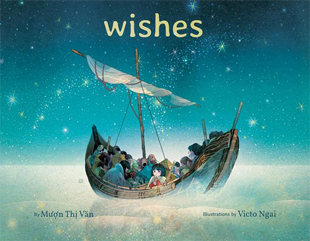Wishes takes the perspective of the things surrounding a fleeing child and her family.
The bag wished it were deeper.
The light wished it was brighter. ...
As we watch adults rolling leaves around rice and packing these rolls into bags, a young girl huddles with her dog, both looking equally fearful and unsure. In dim light, an elderly woman sends incense smoke aloft at a household altar; in the distance it takes the form of flying birds.
The simplicity of the words indirectly reflects the family's overwhelming feelings, and Victo Ngai's illustrations deepen our understanding of just how arduous it is to part with all that one has known. As "the clock wished it was slower," for instance, a grandfather with tears in his eyes hugs his grandchildren, no doubt thinking he will not see them again. Meanwhile the mother, baby swaddled next to her chest, puts a hand to her mouth in response to their dog standing on his hind legs begging to go with them. (He can't.) The illustrator appreciates the text's restraint and omissions and honestly translates emotions with subtle colors and no unnecessary embellishment.
The story carries us along the path to the overcrowded boats and days when "the heart wished it was stronger." At the end, it takes a surprising turn onto first-person perspective, as the child at the center of the tale tells us "And I wished ..." What a powerful wish this last one is, though we won't give it away.
In her closing note, author Mu'o'n Thi Van writes:
"When I hear about secret escapes and border crossings, about family detentions and separations, about fear and loss and also about hope and new beginnings, I can't help but think of my family's own story and wonder: How long and how often will this story be told?" She and Victo have told it masterfully, and the strength of their telling can help move hearts to respond to these ongoing crises of displacement — not only for four to eight year olds, but for anyone with ears to listen and eyes to see. Mu'o'n leaves us with a thoughtful list of ways we can respond, from sharing what we don't need — food, clothing, a room — to petitioning to change laws or volunteering as a language tutor.
